Practicing Harp Happiness
#246: Next Level Repertoire: Turning Baby Steps into Giant Strides
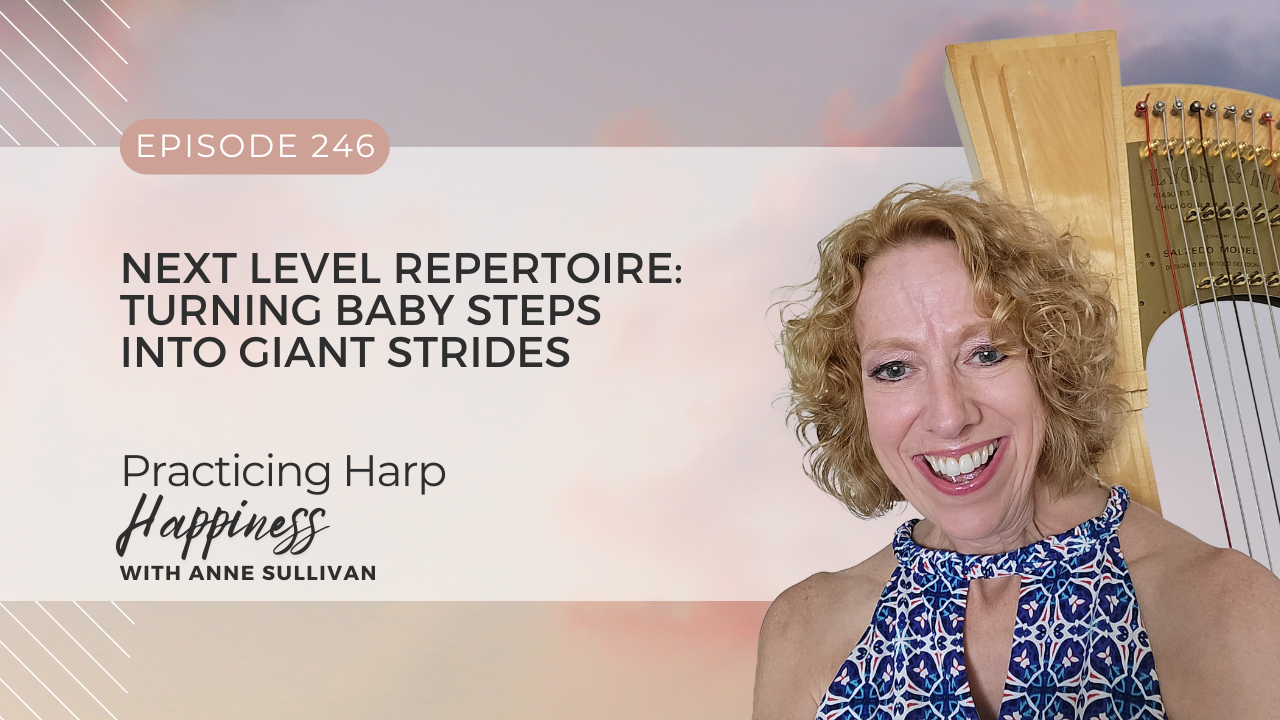
Have you ever started learning a piece that seemed like it should be relatively easy to learn, and then discovered it was actually much harder than you thought? Of course you have; it happens to all of us.
In this situation, we have a choice. We could persist, digging our heels in and fighting our way through the piece anyway. Or we could put the piece aside for the time when we are ready for it. (By the way, that time only comes when we are very focused on leveling up our skills.)
Neither choice feels good, mainly because we feel like we aren’t growing. We feel like our playing is staying at the same level. In fact, one of the reactions I see from harpists in this situation is that they choose to put aside the challenging piece and play another piece by a composer or arranger whose works they know they can play easily. Unfortunately, this can mean that the music they’re playing and the finger patterns they are learning don’t stretch them at all, but actually keep them stuck in t...
#243: Architect Your Harp Playing Growth with 3 Key Systems
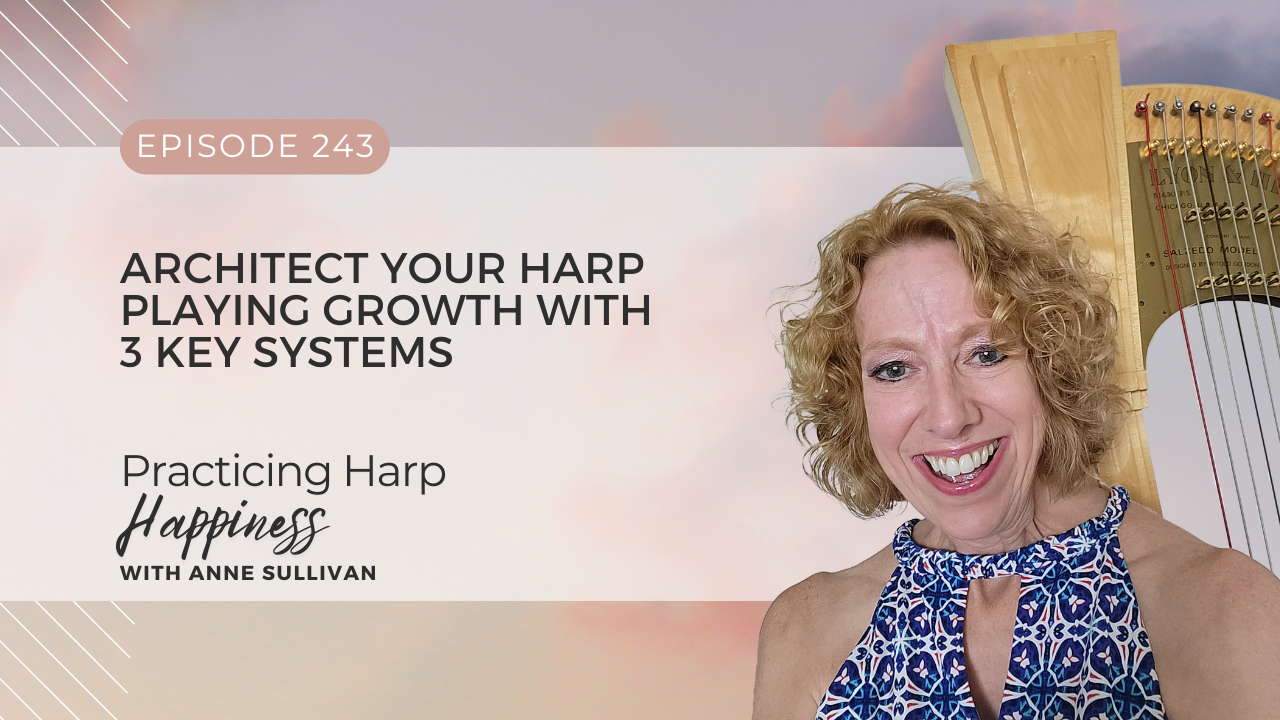
A system is comfort. When we have and follow a system, whether it’s for completing tasks, or crafting, or making a grocery list, our mind can be at ease. Why? Because we know we have the steps to complete our task, and all we have to do is to follow the steps and the task will be done.
When it comes to harp playing, people frequently make one of two mistakes. One is thinking that harp playing is inherently creative, and therefore a system is not only unnecessary, but it will rob your music of its soul. The other is trying to systematize everything about your playing in an attempt to get consistent results or make consistent progress.
If you heard last week’s podcast, you know that the word “progress” is one of the words I’m trying to steer clear of this year, but it is one I am going to find hard to avoid. What’s interesting, though, is that systematization is one of the “progress” traps. Progress, meaning in this case growth either overall growth or integration of a single piece...
#238: How Purpose Fuels Progress: The Map You’ve Been Missing
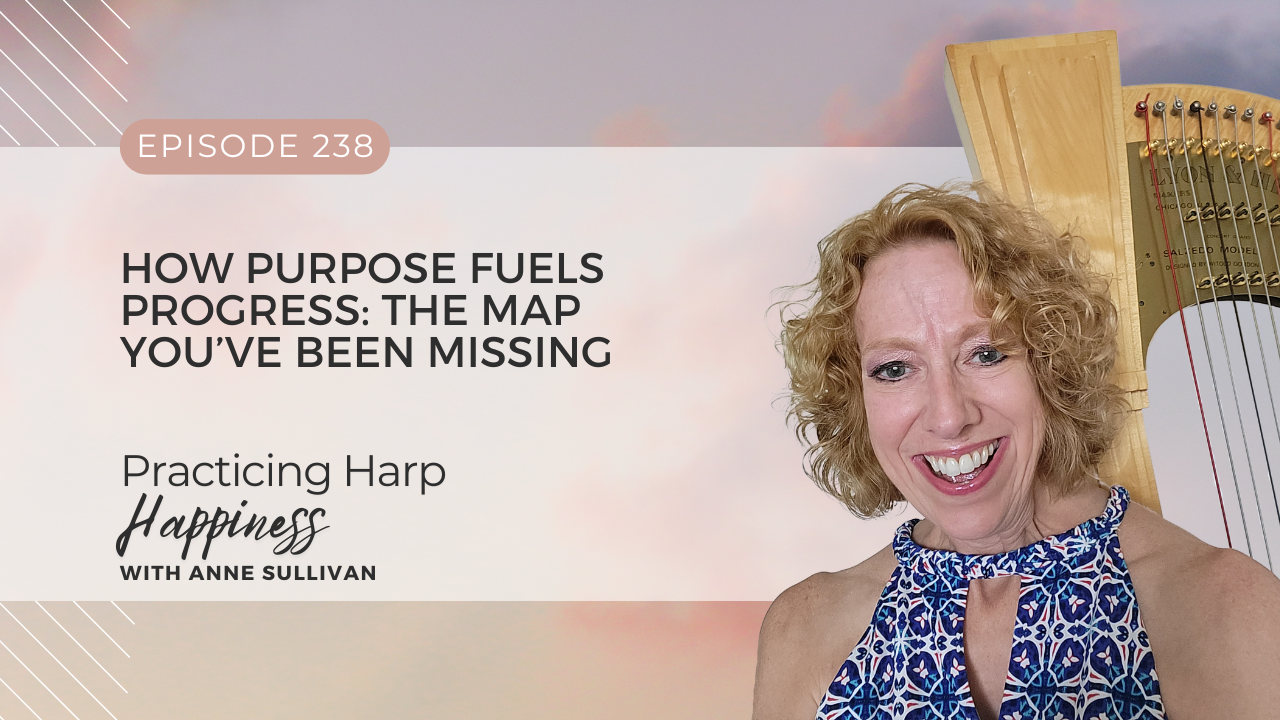
My first ocean cruise was a cruise from New York City to Bermuda. I’d never been on a big ocean liner before. Although I’ve done a couple other ocean cruises since then, I’m not really a fan. I love exploring, and there is only so much exploring you can do on a ship in the middle of the ocean.
But on this first cruise, I did love the feeling of being in the middle of the vastness of the ocean with nothing but water all around. The feeling of not having any landmarks - literally - was a little exhilarating and more than a little awe-inspiring. Naturally, I wasn’t really frightened; I assumed, logically and correctly, that the captain and crew knew where we were heading and how to get there. I myself wouldn’t have had a clue, but I never doubted that I could rely on them to get me safely to Bermuda and back.
Nautical navigation is a mystery to me, and I was impressed by the notion that all the power and energy of the ship would have been useless if the captain hadn’t set a direction...
#236: 7 Quick Fixes so You Can Play Your Stress-Free Best
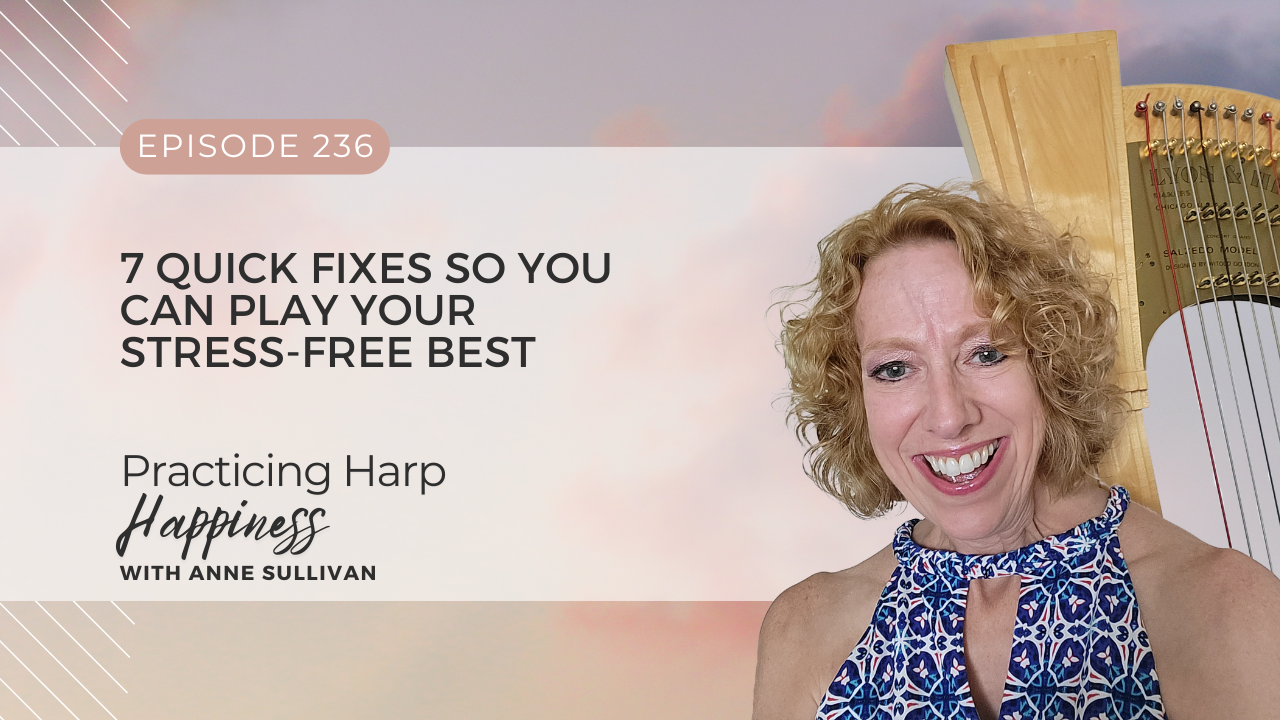
It’s time for a confidence boost.
You’ve been practicing your holiday music and feeling like you’re making good progress, but it’s not quite there and the performance date is coming up soon.
Your music is mostly fine. It has up days when everything goes perfectly and down days when it feels like you’ve never played the piece before. Maybe it’s not quite up to tempo. Or maybe there are just a few measures - or maybe more than a few - that are resisting all your attempts to learn them and play them smoothly. Whatever the issue is, it’s starting to be a little concerning because time is getting short.
We never want to feel unprepared or less ready than we would like for a performance, but sometimes it happens, despite all our planning and preparation. Believe me, I am the last person who would try to tell you that you should have started learning the piece sooner, or practiced more. I know all too well from my own experience that sometimes music just takes longer to come together t...
#234: Three Keys to Relieving Stress
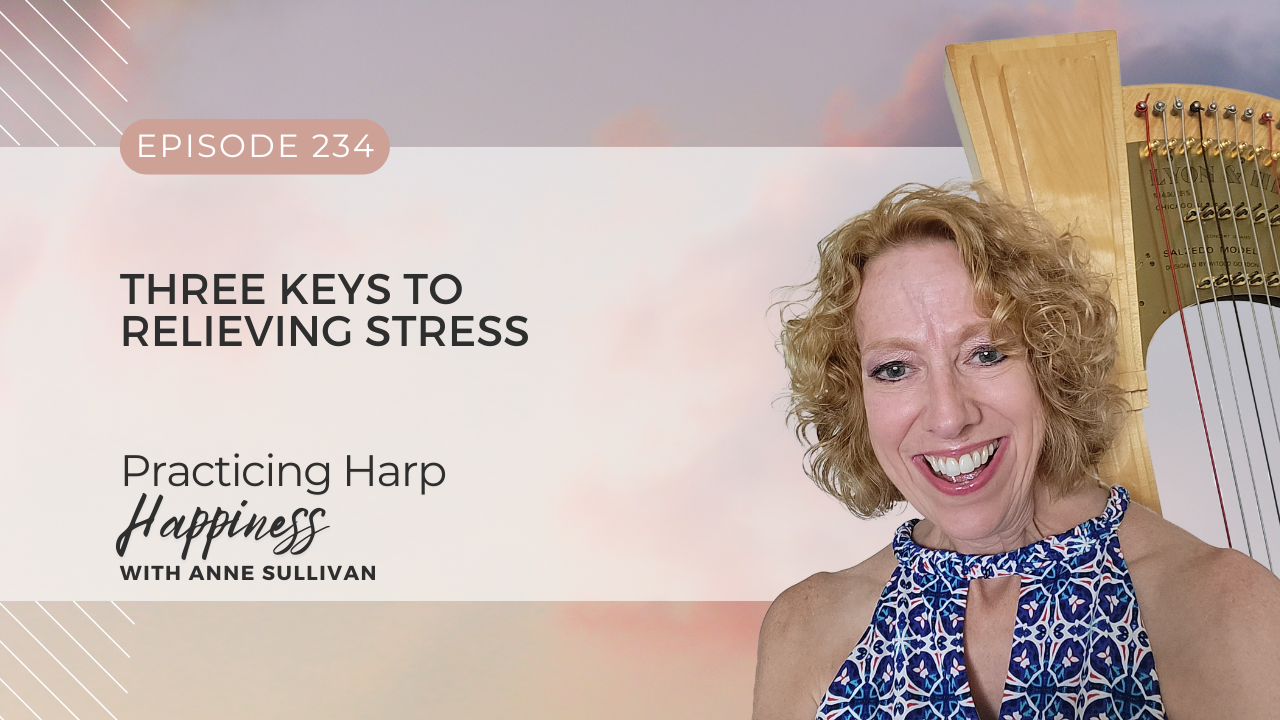
I was moving the harp the other day and once again, it occurred to me just how much stuff we have to carry around with us. Granted, I move my harp all the time for rehearsals and concerts - it’s a big Lyon Healy Salzedo model harp - so you would think I’d be used to it by now. I guess I am, mostly; I don’t have to think about what goes in the car, and my harp bag is always ready to go. But when I start counting the number of trips I have to make between my car and the concert hall in the pouring rain, I start wishing for a Star Trek transporter.
But recently, while I was moving the harp, my bench, my stand, and my bag, I had a flash of insight; we harpists carry a lot of baggage with us. Not a revelation, I know, but it led my mind to consider the other kind of baggage we harpists carry, the stress that accumulates in our practice and performance. That’s a kind of baggage that piles up in a sneaky way until one day, we find it has overwhelmed us. The physical stress that is part ...
#233: A Behind the Scenes Look at My Practice Week
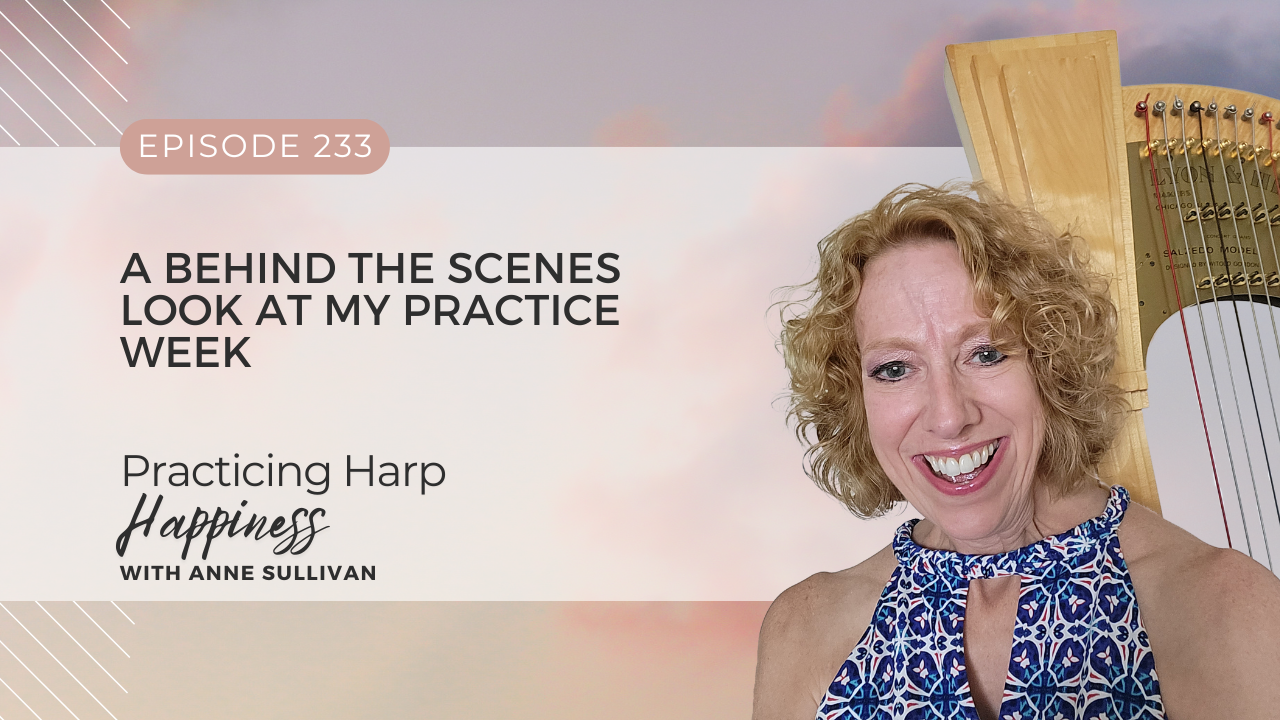
Over the years I have had questions about my practice: how much practice I do, what I do in my practice, and so on. There has also been the occasional request to sit in and listen to my practice. I have always thought that my own practice routines and what I do on any given day in my practice wouldn’t be useful to share with most harpists, the reason being that the demands on my time and on my playing are vastly different from what the majority of harpists experience. And I have never believed that anyone could benefit from watching me practice or listening to my practice.
But gradually I have been led to rethink that opinion. My thinking started to change with the introduction of Practice Labs in our Harp Mastery® Hub.
In case you don’t know what our Practice Labs are, I will fill you in. They are online meetups that any of our Hub members can join, and all that happens is we practice in the same virtual space for an hour and a half. Our cameras are either on or off, and our mi...
#231: Your Simple Six Week Holiday Music Readiness Plan
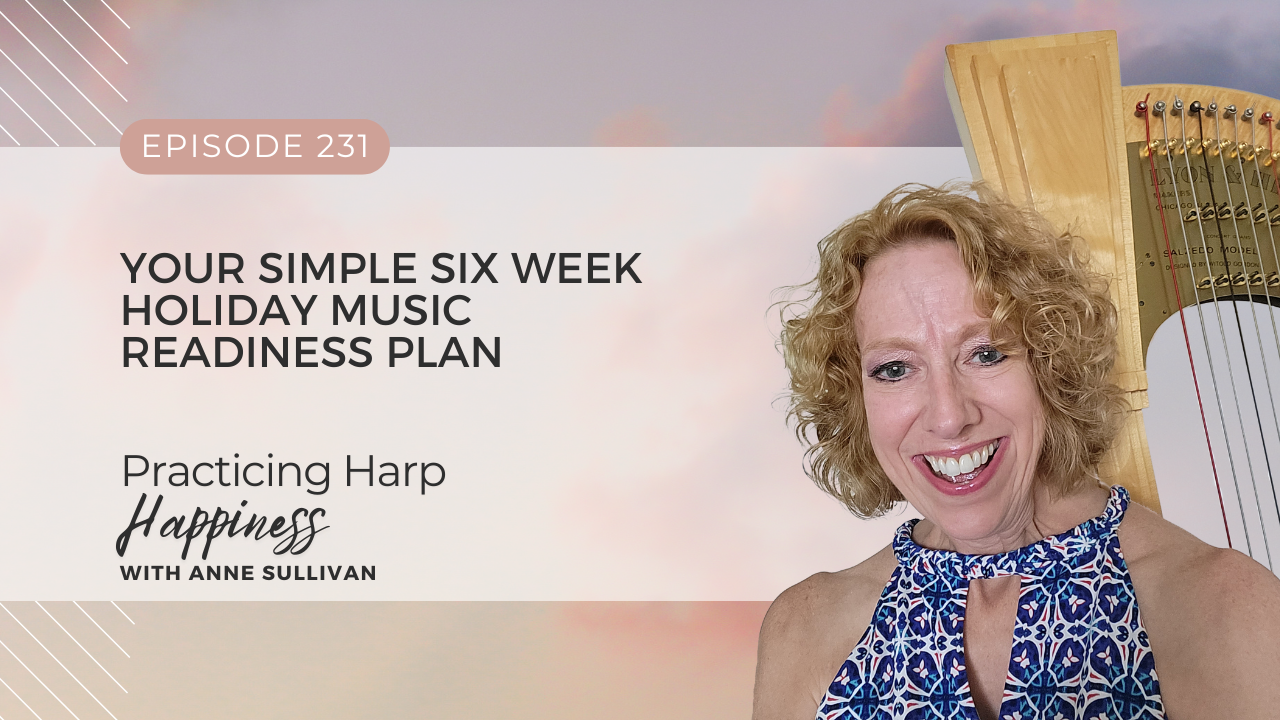
It’s nearly the end of October and already my daily practice is revolving around what I will need to play this holiday season. Yours might be too. The smart harpist knows that this is the time to plan your practice carefully so that you don’t have to cram practice time into an already overloaded holiday schedule. If we feel prepared to play going into the holiday rush, it makes everything about the holidays more fun.
So now is the time to plan. We have about six weeks from now until the end of November. In my own planning I usually use our Thanksgiving as my target date to have my music ready. If you’re not up to speed on American holidays, our Thanksgiving is the fourth Thursday in November, so date-wise, it’s a movable feast, but as it marks the kickoff for our holiday rush, it’s a great target date for music readiness.
Today, I want to share what I think is the easiest and most realistic schedule for making sure whatever music you have to play this December will be ready. I sta...
#229: The 3 Things All Harpists Need to Do Well
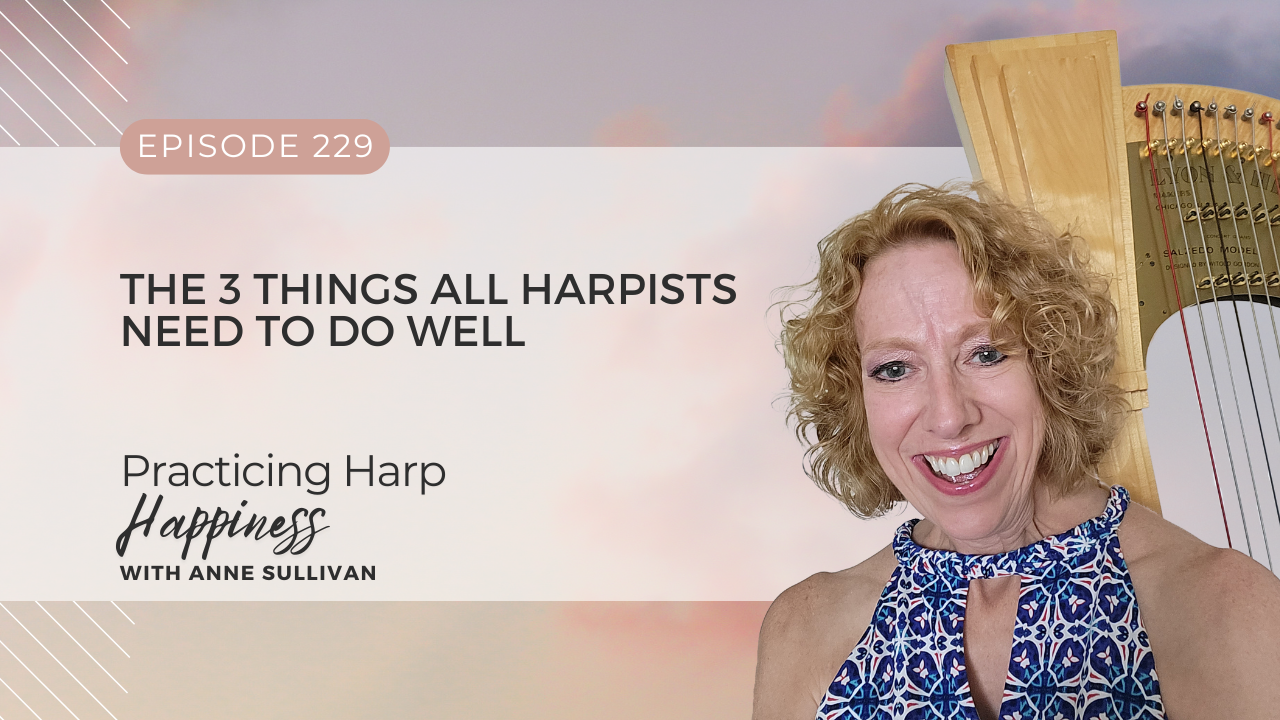
If I were to ask you what you think the most important skills are for any harpist, what would you say?
There are lots of obvious choices. You might include technical skills, like scales or arpeggios or putting hands together. You could mention skills like note reading, or sight reading, or rhythm skills or knowing basic music theory. What about working with a metronome or playing expressively? All of these are important, and none of them is particularly easy.
While all of these are crucial, I consider them all just part of playing the harp. Every harpist develops these skills continually, every day, over a lifetime of playing. Some of them come more naturally than others, but we become more skillful in all of them over time. It’s also a fact that neglecting one of these essential elements - and my list was by no means a complete one - will limit our playing at some time in some way.
Today, though, I want us to think about a different category of skills, skills that are less abou...
#226: Perspective Over Perfection: The Secret to Playing with Freedom
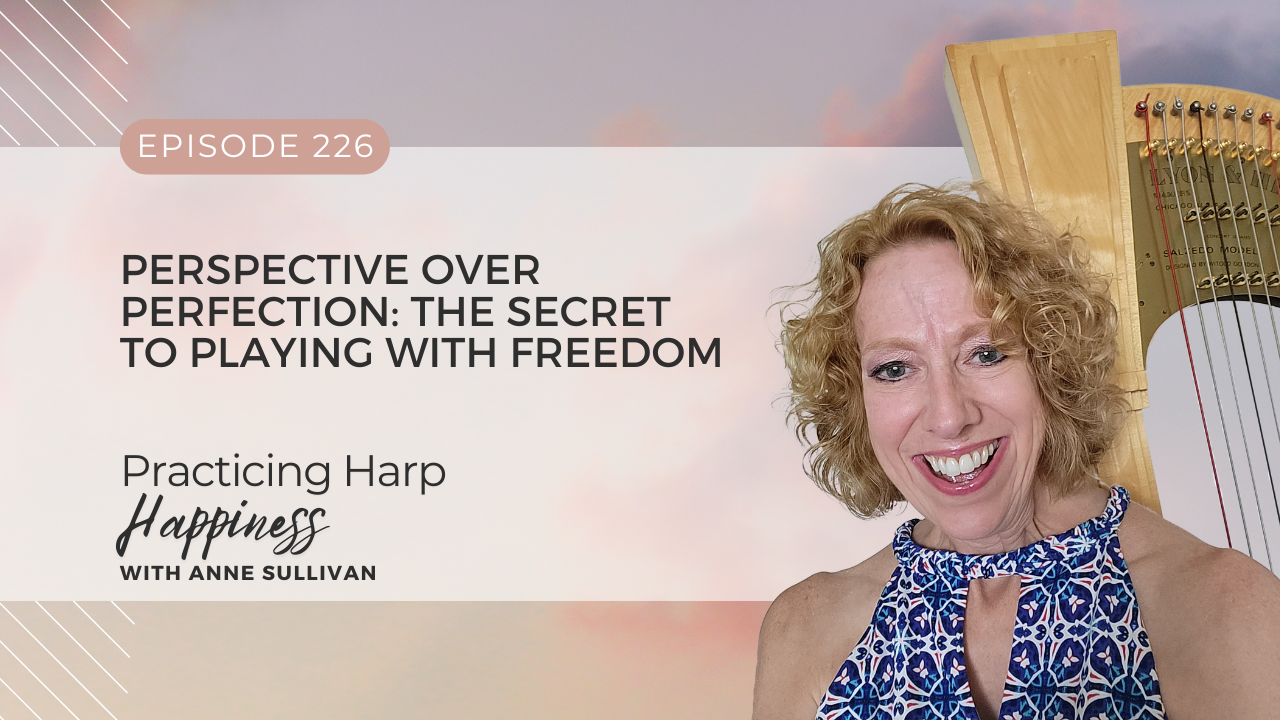
I’m sure you’ve seen that famous optical illusion picture that can be perceived either as two faces in profile looking at each other, or as a vase. That image is named the “Rubin Vase,” after Danish psychologist Edgar Rubin, who authored a book in 1915 called “Visual Perception.” This image, and others like it, have stimulated much scientific debate about how our brains understand and process images.
What fascinates me is that moment when my understanding of the image shifts, that instant where I can see the second interpretation of the picture. Naturally, there’s a technical term for that; it’s called a Gestalt switch. A Gestalt switch occurs when you change your perspective from one view of an image, a sound or an experience. As with the Rubin vase, you first saw it one way - as a vase - and now you see it another way - as two faces. There is much debate about the cognitive processes that allow this switch to happen, but there seems to be general agreement that the switch is ha...
#225: The Surprising Power of Just One More
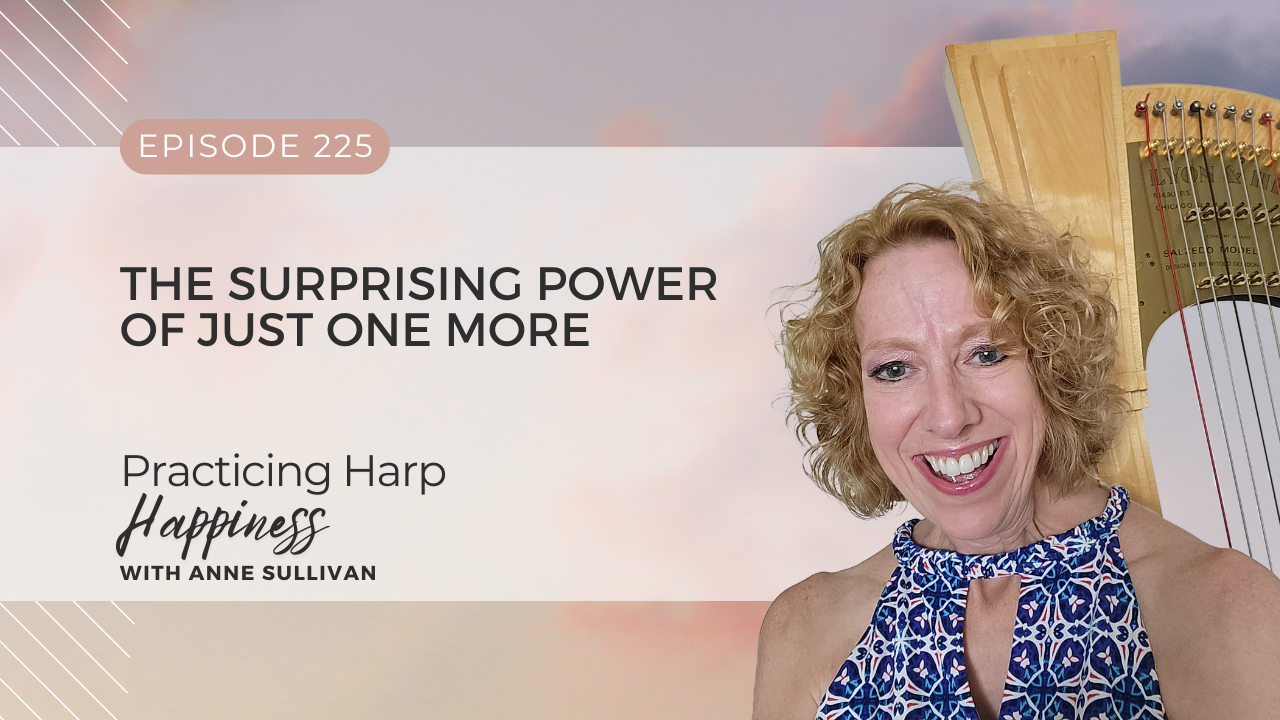
Imagine you’re looking at a box of chocolates, knowing you’ve already had at least three too many. Your hostess is holding out the box to you, saying, “Have just one more. It couldn’t hurt.”
It’s hard to actually know what one more would do. That “one more” candy might be the one that pulls out your filling. That “one more” episode of your favorite Netflix show might turn into an hours-long binge watch. That “one more” task before you leave the house might be the one that makes you miss your train.
But there’s the other side of “one more” too. The extra rep in the gym that builds muscle and stamina. The extra pinch of spice that makes a dish delectable. That extra touch to anything handmade that makes it unique and treasured. Those are just a few examples of the beneficial power of “one more.”
There are lots of opportunities for “one mores” in our harp playing, both helpful and distinctly unhelpful. When you know which of those extras you should avoid, you can stay out of some of...

